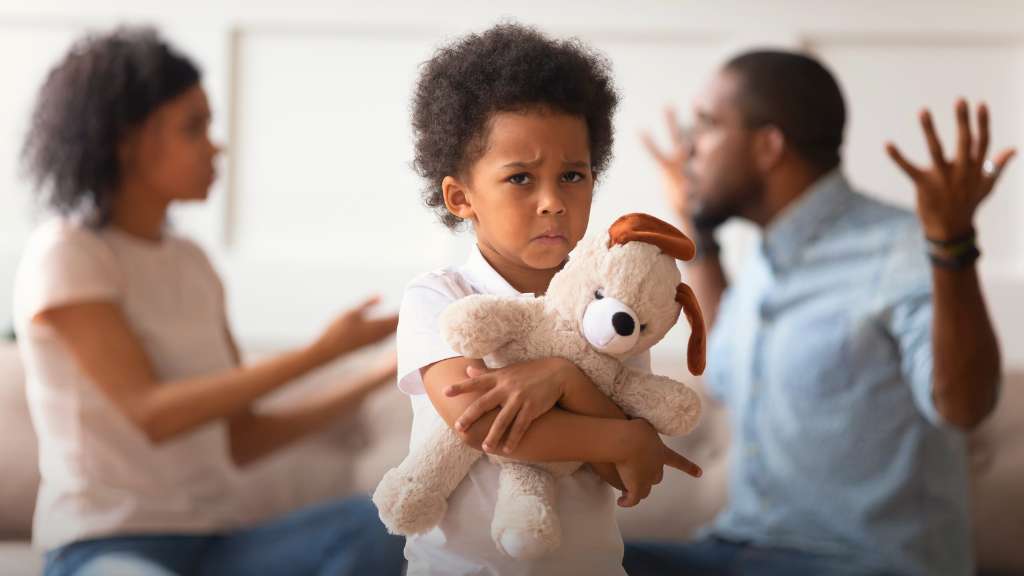
How does divorce affect children? That’s a pretty damp dark zone in a child’s life. Let’s take a light tone to this situation and answer all the questions a parent may have:
- What effect does divorce have on children?
- At what age is the child most affected by divorce?
- Is divorce traumatic for a child?
Divorce can be a rollercoaster ride for everyone involved, especially the kids. But hey, fear not! We’re here to take a lighthearted look at the effects of divorce on children and explore ways to navigate this emotional whirlwind with a touch of humor and a dash of resilience.
Ah, brace yourself for the ultimate reality check! It turns out that parental divorces are about as common as those annoying catchy jingles that stick in your head for days. You won’t believe it, but somewhere between 40% and 50% of marriages end up biting the dust.
Hold on to your socks because we have a jaw-dropping stat for you. According to a super serious study, they discovered that a mere 45% of kids, whose parents were happily hitched at or around the time they were born, make it to the ripe age of 17 with their folks still living the married life.
So, At What Age is a Child Most Affected by Divorce?
Ah, the million-dollar question! According to the “Journal of Little Humans” (totally legitimate, trust us), it turns out that children of all ages can be affected by divorce. From the crayon-wielding toddlers who become professional art therapists to the angsty teens who find solace in writing poetry (or sulking in their rooms), divorce has a way of leaving its mark on everyone.
The renowned “American Psychological Association” suggests that the impact of divorce may vary depending on the developmental stage of the child. For the younglings, aged 3 to 5, divorce can disrupt their sense of security and cause some emotional turbulence. As for the school-age kiddos, between 6 and 11, they may struggle with changes in routines and may experience feelings of sadness or anger.
Off-topic, but did you know that middle-child syndrome is real?
Is Divorce Traumatic for a Child?
Well, well, let’s turn to the esteemed “Institute of Weighing Divorce Drama” for some insight. While divorce can be a challenging experience for children, it doesn’t necessarily mean they’re doomed to lifelong therapy sessions. Kids have an incredible ability to adapt and bounce back, like those inflatable punching clowns. Studies show that with love, support, and a healthy dose of laughter, children overcome divorce.
How Can You Make Your Divorce Less Traumatic for the Child?
Now, here’s the good news: you have the power to make a difference! Mindful co-parenting comes with a few strategies to minimize the turbulence for your little ones.
- First, remember that children thrive on routine, so try to maintain stability amidst the chaos.
- Second, communicate openly and honestly, but please refrain from using your child as a messenger—no kid needs a second career as a courier.
- Finally, add a sprinkle of empathy, a dash of understanding, and voila! We’re well on our way to creating a safe space for our little ones to express their emotions.
That being said let’s take a look at some strategies to help your child deal with the treacherous question “How does divorce affect children?”:
1. Let Your Child Be Upset
It is important to let your child go through the grieving process after a divorce, and it is unlikely for their sad emotions to disappear quickly. Even though parents may feel guilty and want their children to be okay, giving them space to express their feelings is beneficial. If parents can act as emotional coaches, negative outcomes like juvenile delinquency, drug and alcohol use, and teen pregnancy can be reduced.
2. Soothe Their Feelings Of Guilt
Reassure them frequently, saying, “This is not your fault, and there was nothing you could have done to prevent it.” It’s important to recognize that it can be difficult for kids to let go of the hope that their parents will reconcile.
3. Co-Parent With Positivity
Refrain from accusing the other parent or labeling one as good or bad, as it can weaken your co-parent’s confidence. Strive to maintain your child’s love for both parents. Though it may not be easy, aim to handle conflicts maturely. Remember that your children still love and cherish both parents. If you criticize the other parent, your children may internalize it and question their worth or future actions.
4. Make Them Feel Loved
Children might feel anxious about their parents no longer loving each other, thinking that the love they have for them might also disappear. It is crucial to reassure them that though their parents will be living in separate places, they will always be cherished, protected, and looked after. We all assume dealing with a grown child can be easier but a divorce can change all that presumptions.
5. Get Professional Help If Needed
In case your child is facing difficulties, seek professional assistance without delay. The earlier they get counseling, the faster they can recover. Therapy can also aid in repairing the co-parenting relationship. However, it may be necessary to take the high ground and relinquish control over the other parent’s actions. If the co-parent is speaking ill of you to your child, you have limited options. Instead, try to persuade them to prioritize their child’s well-being.
6. Practice Self-Care
Ensure that you are in a positive mental and emotional space but do not isolate yourself. Focus on activities such as sleeping, eating, resting, and practicing mindfulness, prayer, and inner tranquility.
7. Draw A Schedule
Maintain a routine and keep the children’s lives as consistent as possible to create a sense of security. You should avoid becoming the “fun parent” or compensating for the divorce. It can be tempting to try to win over the co-parent by allowing the children to stay up late, play video games at any time, or eat unhealthy food for breakfast. However, this is not beneficial and does not address their needs. Children require stable, consistent, and healthy structures in their lives.
What Effect Does Divorce Have On Children?
When parents part ways, it’s no secret that it can leave a mark on kids of all ages, both in the short and long run. We’re talking about a tag team of mental health issues, lower school performance, and even some potential bumps in future relationships. Keeping this in perspective, let’s delve into some of the frequently observed consequences divorces can have on children:
1. Poor Academic Performance
Picture this: the distracted kids, lost in a sea of thoughts about their changing family circus, are suddenly unable to focus on their homework and classwork. But fear not! With understanding, support, and a pinch of the above-mentioned strategies, we can help them find their lost academic focus.
2. Uninterest In Social Activities
Research on what effect divorce has on children shows that when a family goes through a divorce, the little champs might find it a tad trickier to connect with their peers and may end up with a smaller squad than their non-divorced counterparts. They may also feel uncertain and question if their family is the only one that has gone through a divorce. You need to show them that they’re not alone and that divorce is just one chapter in their unique story.
3. Not Able To Adapt To Change
Children of divorced parents often struggle with adapting to the monumental changes in their lives, like fish trying to ride bicycles. According to a study published in the “Journal of Family Psychology,” these kids may experience difficulties adjusting to the new family dynamics, facing challenges in their emotional well-being and overall functioning. It’s like they’re caught in a game of musical chairs, desperately searching for stability amidst the chaos.
4. Emotionally Sensitive
These kiddos may exhibit greater emotional reactivity and vulnerability due to the stress and changes associated with divorce. This wild ride can stir up a cocktail of feelings like loss, anger, confusion, and anxiety, turning our kids into emotional tornadoes, especially in the first year after separation. By providing a safe space and a listening heart, we can help them remember that every tear shed and every emotion processed is a step closer to healing.
5. Destructive Behavior
As children navigate the tumultuous waters of divorce, lingering unresolved conflicts can pave the way for some surprising risks down the line. Recent research has shed light on the fact that kids who have witnessed their parents’ divorce within the past two decades have a higher likelihood of engaging in criminal activities. These rebellious behaviors, which can take a toll on a child’s well-being, include habits like smoking and even prescription drug use.
6. Loss Of Faith In Family And Marriage
In the end, even though they may dream of having rock-solid relationships in their adult lives, studies have revealed that children who have gone through a divorce are more prone to experiencing divorce themselves. Research on what effect divorce has on children suggests that their likelihood of divorce can be two to three times higher compared to individuals from non-divorced families. It’s like a wild rollercoaster ride that keeps looping through generations.
7. Health Issues
Research suggests that children who have undergone divorce are more susceptible to illness, potentially attributed to factors such as disrupted sleep patterns. Furthermore, indications of depression may surface, intensifying feelings of diminished well-being and further compromising overall health indicators.
An Endnote On How Divorce Affects Children
Divorce isn’t a one-size-fits-all experience for kids. It can stir up a whirlwind of emotions, from confusion and sadness to resilience and growth. Some children may develop superpowers like empathy or a wicked sense of humor, while others might require extra support along the way Remember, life is full of twists and turns, and divorce is just one of those wild rides. Together, you’ll navigate this rocky journey and create a story that’s uniquely yours.





